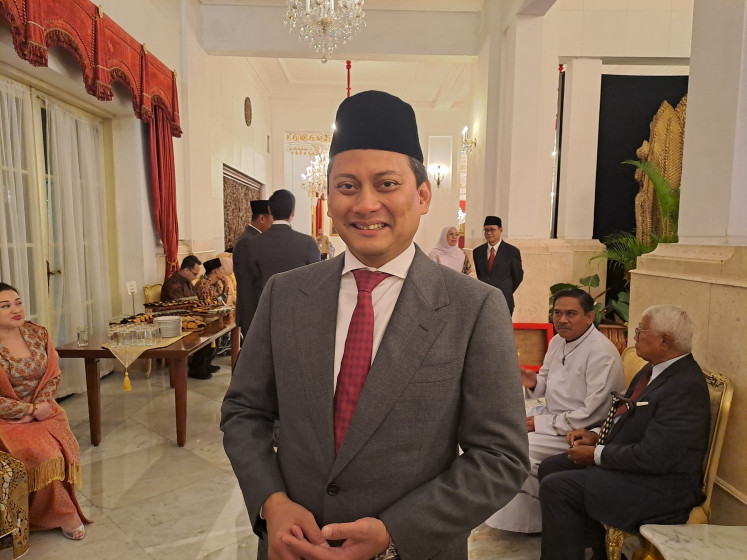Popular Reads
Top Results
Can't find what you're looking for?
View all search resultsPopular Reads
Top Results
Can't find what you're looking for?
View all search resultsRenewable energy key for mining operators to survive
Slumping commodity prices worldwide are putting strong pressure on mining companies to reduce the costs of doing business
Change text size
Gift Premium Articles
to Anyone
S
lumping commodity prices worldwide are putting strong pressure on mining companies to reduce the costs of doing business. In the midst of the government's 35,000 megawatt (MW) program and in-parallel electricity tariff reform, mining operators in Indonesia are considering self-sufficiency upgrades as well as renewable energy solutions.
The price of coal alone has dropped to its lowest level in Indonesia since 2009. The Indonesian Coal Price Reference fell in May by more than five percent month-on-month (MOM) to US$61.08 per ton. Since energy costs comprise an ever-increasing portion of mining operators' expenses, attention is focused on the price of diesel and the cost of transportation to remote sites together with the critical availability and reliability of power from the grid.
Worldwide, new interest is being shown for renewable energy as a viable complementary option for mines. Renewable energy sources such as hydropower, wind and solar are already being incorporated into broader power supply portfolios in key mining regions around the world, such as the US, Canada, Australia and Chile.
Renewable energy can complement power generation from diesel, which remains in Indonesia a non-subsidized fuel at mines and a significant expense. Its drag on cost is most pronounced in remote areas where grid power is unavailable. Delivering diesel fuel to remote sites in central and eastern Kalimantan, for example, as well as islands in eastern Indonesia, is costly and challenged by inadequate available infrastructure, often delayed further by harsh weather conditions such as heavy rain and high waves.
Grid connection, if available, is preferable but reliability and consistency of supply remain critical to mining operations. Blackouts have unforgiving effects on a mine's 24/7 productivity.
At the 2015 Mining Indaba Conference in Cape Town, South Africa, former UK prime minister Tony Blair implored mining industry leaders to recognize the importance of a secure, sufficient and sustainable energy supply to the continent's growth. Closer to home, Indonesian Mineral Entrepreneurs Association Head, Poltak Sitanggang, underlined in August 2014 the importance of electricity supply for mining operations, suggesting savings from fuel subsidy adjustments underway could be reinvested back into infrastructure, including power plants.
In addition, other reforms to electricity tariffs, however, are geared to encourage mining operators to be self-sufficient.
The message from Indonesia's Energy and Mineral Resources ministry has been clear. It has urged mining companies to develop their own thermal or renewable power supplies. The alternative to self-sufficiency is to source a higher quality of reliability and availability through privately financed Independent Power Producers (IPPs), a group earmarked to develop 25,000 MW of the 35,000 MW planned by the government by 2019.
A number of mining companies are already complying with self-sufficient thermal solutions or sourcing supply through existing IPPs, easing the strain on the existing grid. Much more is encouraged and, as we have seen in other parts of the world, renewable energy could become a more prominent and complementary power source for large industrial users in Indonesia. There are already such examples of hydropower being used. The smelting and nickel ore processing facilities at mining operations in Soroako, for example, have been harnessing renewable energy from water for decades.
Today's market reforms and global commodity price pressures are creating a case for renewable energy as mining operators take greater interest in the potential for cost savings, as well as its potential to answer public and shareholder demands to reduce greenhouse emissions.
Integrating renewable energy into a traditional coal-fired or diesel power supply can reduce expensive fuel consumption by generating electricity when the sun is shining, for example. When the renewable system is not generating power, diesel generators ensure the mine's energy demands are met without interruption.
Capital costs are associated with adding renewable energy to the mix but investing capital upfront may generate overall cost savings. Depending upon the specific location and availability or suitability of renewable power, low- to medium-penetration renewable power systems can be integrated with diesel power to meet 10 to 30 percent of the mine's energy demand. This results in a direct fuel cost savings and a reduction in the number of fuel deliveries required. The mining operation will realize lower risk and more certain energy cost forecasting, offsetting the upfront capital cost.
In addition to improving the security of power supply, mining operators in Indonesia have a golden opportunity to demonstrate a more progressive sustainability side of the business as they plan and invest in their future operations. Most importantly, the opportunity offers significant cost-containment at a time of a changing and demanding market.
Favorable environmental factors such as plentiful solar or hydropower in Indonesia make renewables a sensible addition to the mining operation's power portfolio mix in terms of cost and boosting reliability of supply.
____________________________________
The writer is country manager and vice president, Indonesia, Black & Veatch consulting and construction company. This is a personal view.










